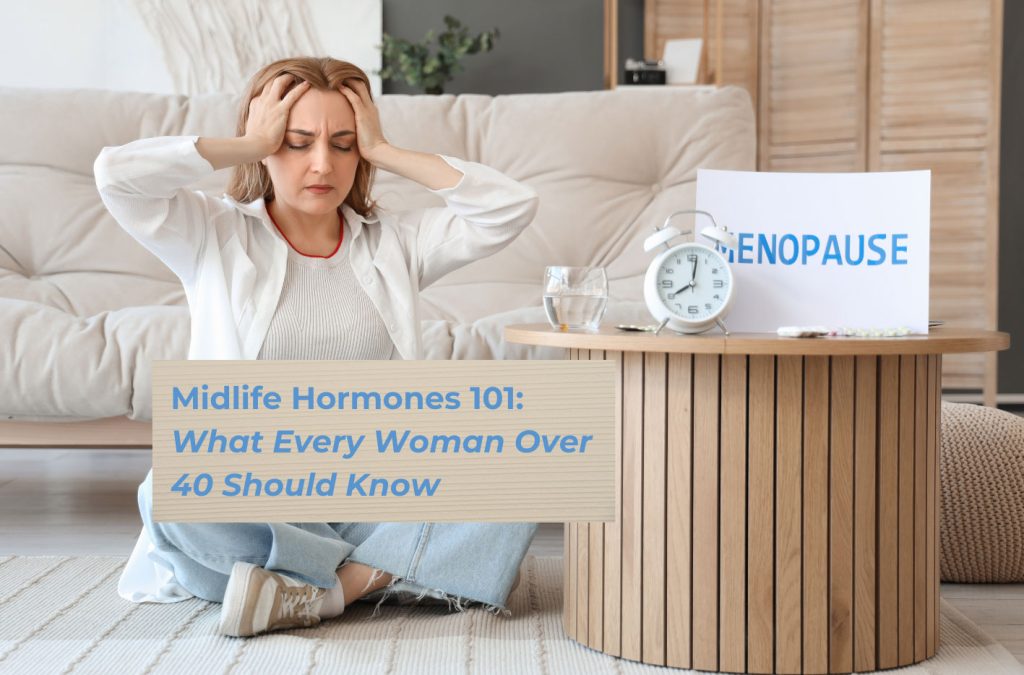Each year, over a million women in the US will hit a new milestone in their lives, Menopause. While 99% are unaware of what’s happening and are definitely not ready for what’s waiting around the corner with the stages of perimenopause and beyond. That’s because no one really tells us what to expect from menopause past
the typical late symptoms like facial hair or hot flashes. No one talks about the subtle symptoms that add up to one big catastrophe, so we don’t know how to deal with the ups and downs or the curveballs that get thrown our way all at the same time. After all we are at one of the best ages to be in life, we deserve to feel our
best and thrive through our 40s and beyond.
Most women know that menopause and hormones are linked together, but don’t have much knowledge about what’s actually changing with your hormones. So get excited! Today you are getting a crash course in hormones, menopause, what to watch out for during this time, and how you can be and feel your best and thrive through these years.

The 4 Hormones That Guide Your Journey Through Menopause
While you have over 50 sex and stress hormones in your body, it’s two of your sex hormones that act as the main characters in menopause…along with 2 other very important hormones that are hidden behind the scenes that we don’t often realize are associate with menopause.
Estrogen: The Foundation
Estrogen is the essential female hormone and controls everything from reproduction to menstrual cycles and heart health. But its job doesn’t end there— estrogen also helps keep your moods stable, your mind focused and your skin moist and clear.
As you move into perimenopause, and later on through menopause, your estrogen levels start to decline at a slow and steady pace. At a certain point it drops o like a steep hill on a roller coaster. Since Estrogen is the gatekeeper to keeping your body’s systems balanced, lower levels start to trigger unwanted symptoms like high cholesterol, hot flashes, brain fog, irritability and dry-itchy skin. Later symptoms include facial hair, weakened bones leading to osteoporosis and cardiac problems.
Progesterone: The Calming Hormone
Progesterone is the hormone that keeps you balanced and calm. In your teens through about 40 years, it plays a crucial role during pregnancy. During the phases of menopause, just like estrogen, progesterone also declines as well. This can interfere with your sleep, causing middle of the night awakenings. It will slow down your cycles, causing shorter and more irregular periods as menopause approaches. When progesterone levels get too low, you can feel o-balance physically, mentally and emotionally.
Thyroid: The Often Forgotten Hormone
The Thyroid Gland and the thyroid hormones play an important role in regulating metabolism, energy, mood and body temperature. During menopause, hormonal fluctuations and changes, including those in thyroid function, can have a significant impact on a woman’s overall health and well-being.
The Thyroid gland produces 2 important thyroid hormones (T3 and T4), which regulate the body’s metabolism, heart rate, and energy levels. These hormones are controlled by thyroid-stimulating hormone (TSH)
During menopause, estrogen levels drop, which can affect thyroid function. Estrogen plays a role in thyroid hormone production, and its decline may contribute to thyroid-related problems, including Hypothyroidism and Hyperthyroidism.
The problem is that many symptoms of thyroid disorders overlap with those of menopause, making it difficult to differentiate between the two. Symptoms like fatigue, mood swings, weight changes, and sleep disturbances can be caused by thyroid problems and menopausal hormone changes. This overlap can sometimes delay the diagnosis of thyroid conditions during menopause, as they are often attributed solely to hormonal shifts due to menopause.
Regular screening for thyroid function during menopause is important, especially for women who have a family history of thyroid disease. A blood test measuring TSH, T3, T4, and Thyroid antibody levels can help determine whether thyroid function is normal or if there’s a need for further investigation.
Testosterone: The Overlooked Hormone
Most people think of Testosterone as a “male” hormone, but surprise, women have testosterone too, just not as much as guys do. In comparison, we only have 10-20% of the amount of this hormone that men do. So what does this hormone do for women? More than you would think! It boosts your moods as well as your libido, improves muscle tone, balances energy levels, and helps with your ability to focus.
When you get to menopause, your already low testosterone levels drop even lower. You will know this is happening when you start developing facial hair, your lady parts are unusually dry, your libido is gone, and your muscle tone is replaced by cellulite regardless of how much you exercise. So even though testosterone doesn’t get the attention that estrogen & progesterone do, it’s still vital to keep an eye on this hormone to keep you healthy, strong and motivated, especially during menopause.
Before you rush to grab the newest hormone cream to rebalance your estrogen, progesterone, thyroid or testosterone, you need to know your baseline hormone levels and all of the rewards and risks involved.
The Not So Pretty Side Of Hormone Products
Life would be great if all of the hormone products and supplements worked like the bottle says, with a promise to balance our hormones. It would be wonderful if all hormone products could just “work”, but the reality is they’re not all created equal.
Vitamins, creams and supplements are not regulated by the FDA, so there is no guarantee of how much of the actual supplement you are getting in your dose. In addition, many products come with unwanted chemicals like parabens, phthalates, and other environmental toxins. This is especially true with hormone patches and creams. These toxins disrupt your body’s natural hormone balance and can trigger bigger health issues, including an increased risk of female cancers. If you look closely at the ingredients, you will find a boat load of chemicals hiding in your supplements, products and food. Don’t be fooled by clever marketing, all of these chemicals can have an impact on your hormones. You deserve better.
One Size Does Not Fit All
Finding the right supplements or HRT to balance your symptoms can be very tricky. What worked for Sally, may not work at all for you. With different genetics, hormone levels and detox pathways, we all function a little bit differently.
Hormone Replacement Therapy (HRT) works by replenishing hormones that your body is struggling to produce itself. In the right dose for the right person you can eliminate menopause symptoms like insomnia, low energy, hot flashes, night sweats, mood swings & low libido and feel normal again. For the wrong person, none of this works and you gain a bunch of unwanted weight.
When you supplement your estrogen, progesterone, and testosterone, I can’t express how very important it is to monitor. If your doctor is not monitoring your hormone levels, in my opinion, they have no business prescribing them in the first place.
Not every HRT protocol is right for everyone. There really is no cookie cutter approach to balancing hormones, so it’s crucial to read the ingredients and see if the supplements or medications you are using are tested for purity and safety. So before you dive into those supplements or HRT to manage your symptoms, I recommend you do a little homework first:
☑ Start with advanced gut and hormone testing
☑ Make sure your protocol is personalized for your individual needs
☑ Use supplements or HRT that use 3rd party testing for quality control
☑ Use plant based supplements & organic medical foods
☑ Use a good coach and doctor to guide you through the process
Remember Menopause Is A Normal Stage of Life, Not A Life Sentence
A little bit of science and knowledge goes a long way. Educating yourself about what’s happening to your body and all of your hormones gives you a chance to make sure out-of-balance hormones don’t ruin your life. You’re also much less likely to be misled by clever marketing or doctors who just want to prescribe something to cover up your symptoms. Hang in there, I promise it gets better.
If you want to find out your hormone levels before starting therapy or monitor levels during therapy, you can learn more here: https://herfunctionalwellness.com/lab-tests

